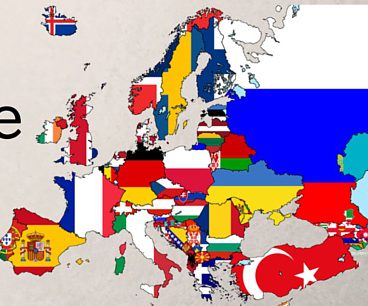What is Europe?
I self-define as a European Jew. Like many Jews, my ancestry spans the length and breadth of Europe, from Spain and Holland to Austria, to the UK. My Jewish friends have family from Germany, Poland, the Ukraine, Russia, Hungary, the Czech Republic, Portugal and the Balkans. Our Jewish family histories, rather than being national and local histories are frequently transnational spanning the whole continent.
Historically, Jews transnational European connections have been integral to Jewish communal life. Jews were often associated with their trading links, with the transnational links fostered by the dispersion of Jewish families and communities being used to provide links for trade and the transportation of goods. In early modern Europe, Jewish communities provided the links between the great trading hubs of Amsterdam, Antwerp and Venice.
They facilitated the spread of ideas, culture, food and languages across the continent Jews. Jewish or people of Jewish origin played a vital role in the spread of Enlightenment ideas across the continent, whether it be through the writings of philosopher such as Moses Mendelsohn or Karl Marx or the participation of Jewish communities in the great enlightenment revolutions, such as the Hungary revolution of 1848. The shared identities and ideas that have formed the basis of the European experiment were pioneered by European Jewish communities.
Jewish European links and identities have often served as a sanctuary from anti-Semitism. A cursory glance at the history of Europe will show that Jews have been expelled or forced to run from almost every country or city within Europe. In these incidences we have sort refugee across Europe. When Jews were expelled from Spain and Portugal many sort refuge in Holland. When we were expelled from Frankfurt we sort refuge in Hamburg. We ran from the pogroms in Poland and Russia and we settled in Germany. Many of those that could run from the holocaust ended up in Britain. The transnational European nature of the Jewish community has for centuries offered a safe place for Jews where the country they were living in became unsafe.
European Jews have often been excluded from full participation in European national life through anti-Semitism. This was often the result of their fleeting presence in a town, always liable to be evicted by national or local authorities. Often this was through subtle processes of othering, or discrimination in terms of employment. Sometimes it was less subtle, through clothing rules or Ghettoisation, a process that literally and metaphorically erected walls between Jews and their Christian neighbours. These processes and ideas led many to identify and be identified as citizens of Europe, the source of their income and their protection, rather than of a particular European nation.
In many ways the development of European Jewish identity mirrors the development of the European Union. It was founded after the Second World War, as part of the call, led by Jews, that such a thing should never happen again. It aimed to move past the petty nationalisms that had been exclusive of Jews and had wrecked such destruction over Europe and European Jewry. It sought to build trading links based on trans-national cooperation. The new organisation had human rights courts to extend that protection. Freedom of movement means that if need be European links can be a sanctuary against anti-Semitism, which is a rising force in many European countries.
For me, my Jewish identity is intimately connected with Europe. Jews have been at the forefront of European cooperation and transnational links for centuries and have historically had more investment in them than national solidarities. Jews have taken an active role in European political and social life. As part of this tradition and Liberal Judaism’s tradition of informed decision making we should take our opportunity to shape the future of trans-national European cooperation and make sure we remember to vote (or tell people who are eligible to do so) on the 23rd June.

